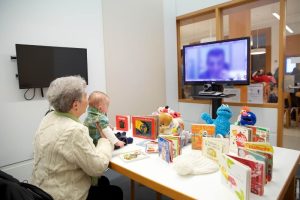
Innovation Roadmap: HeartLine
Feature Images Source: Canva
The Idea
San Francisco Public Library (SFPL) will establish a free video visitation program, titled HeartLine, to enable families, especially children, to connect with loved ones who are residing in correctional or detention facilities. The HeartLine will provide 1-hour scheduled video calls hosted in former study rooms, equipped with secure audio-visual connection, in partnership with local institutions. The SFPL will create child-friendly environments with books, toys, and sensory comforts to foster connection and safety. The core goals of this program are to strengthen family connections, reduce emotional stress caused by separation, promote literacy efforts between children and incarcerated parents, and support reentry outcomes. Target users include children of incarcerated parents, caregivers, formerly incarcerated individuals, and community members affected by the justice system. This service removes barriers related to cost and travel, promotes mental-well being and reunited families, and affirms the library’s role in promoting non-judgmental, equitable family services, especially in communities with high incarceration rates.
Mission & Institutional Context
SFPL’s mission is “to connect diverse communities to learning, opportunities, and each other”. Recent local data highlights high incarceration rates and families struggling to maintain regular contact due to financial, geographical, and logistical barriers. Current related programs operated or outsourced by the SFPL Main Library and its branches include reentry services, legal aid referrals, and both child and adult literacy programming. This initiative aims to deepen our impact on vulnerable community members by providing local, trusted, and trauma-informed services that provide direct connection to families. This service is guided by three of our core values: well-being, equity, and community.
Action Brief Statements
Convince children and caregivers that by using the library’s HeartLine video visitation spaces, they will safely and comfortably connect with incarcerated loved ones, which will strengthen family ties and emotional health because the library’s mission is to support its community in reconnection and belonging.
Convince library staff that by facilitating private video visitation visits, they will provide meaningful emotional support and community trust, which will expand our library’s mission, because libraries are essential connectors in people’s lives.

Inspiration
Brooklyn Public Library – 11 branches of the BPL provide TeleStory services, private video calls to family members who are incarcerated in NY Detention Centers.
Guidelines & Policies
In line with Michael Stephens’ reminder that “technology is not an end in itself but a tool to help us meet our libraries’ service goals” (Stephens, 2004), this service is designed to supplement, not replace, in-person visits between incarcerated individuals and their family members. The HeartLine program will operate in soundproof, private rooms that have been designed to support connection and family well-being. The SFPL will repurpose 2 underutilized study rooms for HeartLine visits. These rooms will feature comfortable, child-friendly furniture, books, toys, and visuals to create an environment that feels safe.
Appointments will be required and made available to individuals with incarcerated relatives or loved ones. Families and children with incarcerated parents will be prioritized for these appointments. Video calls will last up to one hour.
To foster trust and privacy, policies will be in place to ensure that video calls are not recorded and sessions will remain confidential. Library staff will help to set up the space and connect the call, but will not remain in the room during a video call. They will be available for technical assistance as needed. All children must be accompanied by a guardian who can provide signed permission for the child to video call the incarcerated family member. Bilingual library staff or translation services will be available to ensure participants understand the service guidelines and authorization.
Representatives from Outreach Services, Library Legal Counsel, IT Services, Facilities, and the library’s social worker will develop policies, provide technical planning, and implement services.
Timeline
A phased rollout allows us to heed Stephens’ caution that “new technologies will not save your library…[and] cannot be the center of your mission” (Stephens, 2012). SFPL will take an iterative approach to the development and implementation of this program. The HeartLine project will follow a phased rollout to ensure successful implementation and to address technical issues along the way.
Phase 1: Planning and Room Design (4 months)
- Finalize technology specs
- Develop and sign partnership agreements
- Refurbishment of study spaces and installation of equipment
Phase 2: Staff Training (2 months)
- Trauma-informed care
- Technical support for audio-visual equipment
- Privacy and ethics
Phase 3: Pilot Launch (3 months)
- SFPL Main and branches in Bayview and Mission will provide HeartLine appointments 2 weekdays and 2 weekend days.
- Gather feedback from participants.
Phase 4: Expand services to 6 additional branches (tbd)
Marketing & Promotion
Internally, the HeartLine service will be promoted via all staff updates, smaller team meetings, and announcements via the library’s intranet. Flyers will be posted at all library branches.
Externally, flyers will be provided to detention centers, reentry service providers and nonprofits, and family support organizations citywide. Additionally, the flyer will be sent out monthly via newsletter. Outreach staff will attend local community meetings. A press release will accompany the launch to generate media coverage.
The campaign’s core messaging will emphasize free access, privacy, empathy, and the library’s role as a compassionate connector during challenging times. Communications will emphasize that the SFPL is a place for families of all types.
Staff Training
Staff training will be co-led by the Outreach Services and IT teams in collaboration with local child welfare and social work professionals. Key topics will include trauma-informed service delivery, how to operate the audio-visual equipment, conflict de-escalation, and patron privacy. This training will include practice setting up and troubleshooting the equipment and practicing different scenarios. Tech guides will be located in all HeartLine appointment rooms. By involving staff early, we can circumvent buy-in disasters that may occur when staff are surprised by new technology (Stephens, 2004).
Evaluation and Future Expansion
Program success will be measured through both quantitative and qualitative indicators. Key metrics will include the number of monthly visits, unique families served, and repeat visits. The services will also be evaluated by anonymous participant surveys, provided in multiple languages, to understand the emotional and social impact of the service. Feedback will also be collected from community partners to guide iterative improvements.
Longterm expansion could include HeartLine services at additional branches citywide and virtual visit kiosks at SFPL’s mobile library vehicles, which would extend access even further.
References
Brooklyn Public Library. (n.d.). TeleStory. https://www.bklynlibrary.org/outreach/justice-initiatives/telestory
Brooklyn Public Library. (n.d.). What is televisiting? https://www.bklynlibrary.org/outreach/telestory/what-televisiting
San Francisco Public Library. (n.d.). Strategic planning. https://sfpl.org/about-us/strategic-planning
Stephens, M. (2004, November 1). Technoplans vs. technolust. Tame the Web. https://tametheweb.com/2004/11/01/technoplans-vs-technolust/
Stephens, M. (2012, May 30). Taming technolust: Ten steps for planning in a 2.0 world (full text). Tame the Web. https://tametheweb.com/2012/05/30/taming-technolust-ten-steps-for-planning-in-a-2-0-world-full-text/


2 Comments
Daisy Chia
Wow, what a beautiful idea. I love this. Great work @chandler. This makes visiting loved ones who are incarcerated much more child friendly by hosting it in a specially designed room at the library.
LibbyLibbyLibby
@chandler Well done and so innovative! Your idea absolutly made sense to me. In Information Communities (INFO200), I focused on family reunification when I was inspired by a family in the youth library during a supervised visit with a social worker. Takes me back to when we took a deep dive into the barriers and information seeking behaviors of this communty. Thank you for your thoughtful plan.